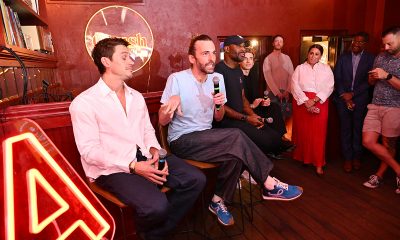Arts & Entertainment
‘Closer’ to the mainstream
Tegan and Sara play Merriweather this weekend with fun.
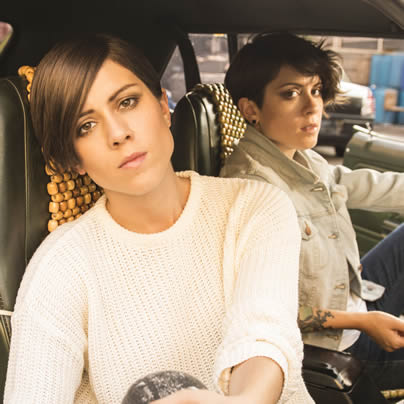
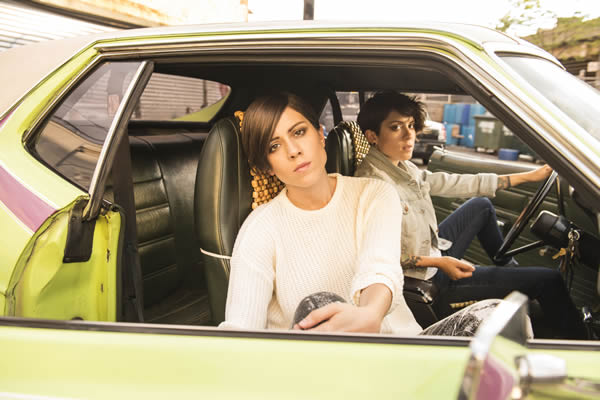
Tegan and Sarah say their decision to go in a more pop-friendly direction on their latest album was a conscious move. It paid-off with their highest selling album to date. (Photo by Lindsey Byrnes; courtesy Warner Bros.)
fun.
‘Most Nights Summer Tour’
With Tegan and Sara
Saturday
6:30 p.m.
Merriweather Post Pavilion
10475 Little Patuxent Parkway
Columbia, MD
$35-45
ournameisfun.com
teganandsara.com
This year has been undoubtedly the biggest of Tegan and Sara’s career.
Their album “Heartthrob” dropped in January and debuted at No. 3 on the Billboard Top 200 more than doubling the group’s previous peak for first-week sales. It went gold earlier this month in their native Canada. The Quin twins have been on a media blitz that included Ellen, Jay Leno and Jimmy Kimmel and even had their hit single “Closer” featured on “Glee.”
http://www.youtube.com/watch?v=etq2vdLieTM
Just before their HRC concert in New York next week (July 25), the lesbian sisters (now 33) are scheduled to play Merriweather Post Pavilion this weekend on the fun. “Most Nights Summer Tour,” which kicked off earlier this month in Toronto and runs through the end of September. We caught up with Tegan last week. Her comments have been slightly edited for length.
WASHINGTON BLADE: How’s the tour going?
TEGAN: It’s mostly been awesome, though we’ve only had one weekend so far.
BLADE: How do the crowds feel compared to your own headlining shows? Obviously there are a lot of people there psyched up for fun.’s set right?
TEGAN: Yeah, but it’s kind of hard to generalize. They have a real awesome music-loving audience. It’s more mainstream, yet still pretty awesome. You get up there and work your ass off to win them over but there’s been a lot of recognition when we play, especially the new stuff, the stuff that’s been on radio, so it’s been really good. They’re great allies and good friends of ours so we really enjoy doing it and it’s a really awesome opportunity for us.
BLADE: Do you have much interaction with them backstage?
TEGAN: We’ve known the guys for years and we even toured with Jack (Antonoff) on our last record for about three months, so we’re quite friendly and hang out with them but it’s a busy time for both bands. In the down time we’re trying to squeeze in a million things like radio stuff and meet and greets. But Sara and I watch the show every night. We have a courtesy mix set up at the side of the stage so we can hear the front-of-the-house mix there for us on a monitor. It feels like summer camp. It’s great.
BLADE: How long is your set?
TEGAN: We play 60 minutes. They play about 90.
BLADE: Any collaborations so far?
TEGAN: Not yet, but we’ve talked about it some. Our labels were pushing for some acoustic versions of each other’s songs but all of us have been busy so far, so we’ll see what happens.
BLADE: Other acts say U.S. pop radio is an especially tough nut to crack. “Closer” was a No. 1 dance hit here but didn’t quite crack the Hot 100. Do you think it’s harder to break a song here? If so, why?
TEGAN: It’s definitely really different in the U.S. It’s very unique. The life cycle of a single in the U.K. is six weeks and in Canada it’s three months. … It’s different too at different formats. We started mostly at college formats but have moved over to pop, which is great, it allows us to have a long life and good reach at radio. Sometimes we think as a band, “I can’t believe they’re still working that song.” But as a band, we don’t make singles, we make records so we’re very old school in that way, it’s just our instinct. Sometimes, yeah, we wish they could work another song but that said, each time we get added at another station, we see our fan base grow in that market and that’s really why we took things in that direction this time. We really wanted to change the face of mainstream radio. We’re queer and alternative but we also love pop songs and we felt it was time to see someone like ourselves represented in the mainstream. We’re reaching young audiences, these kind of queer, fringe, alternative kids and it’s really exciting. But it’s an expensive nut to crack. But I think it’s a cool time in pop music where you’re seeing more bands like fun. and f(x) who have broken into mainstream pop. I think it’s reflecting a lot more integrity than there’s been in years.
BLADE: You and Sara have talked a lot about consciously wanting to broaden your reach with this latest album. How much of the more pop-friendly sound is inherent in the songs themselves versus what the producer brings to the table?
TEGAN: I think it’s absolutely there in the foundation of the songs. Like with “Closer,” that was rebuilt about six times before we even got to the studio … which is where the song really takes flight, but the foundation and architecture, all that happens at home. But before we’d even hired a producer, we knew we were moving more in that direction. It’s still pretty emotional and dark but we knew we definitely wanted more pop instrumentation and really liked the idea of juxtaposing these dark scenes with more pop music. A lot of that comes from our background. We grew up listening to all this pop stuff from the ‘80s and ‘90s music.
BLADE: It’s easy to get you two mixed up — you’re the one with slightly more body in your hair, right?
TEGAN: Yes. I’m not quite sure how that happens but it’s interesting to see the slight differences in identical twins. My hair is a little curlier. Sara needed a retainer when she was 12, I didn’t.
BLADE: How much of your look — which appears pretty planned out to play on the whole twin visual — is discussed? Like if one of you wanted to grow your hair out or bleach it blonde, would you talk about it and discuss what kind of image you’re projecting as a band?
TEGAN: A lot of it just happens naturally without any big discussion. I actually did grow my hair out after the last album. Down to about my shoulders. And then when we were recording and filming and I started seeing photos I was like, “Ugh — too much hair” and I cut it short again. We have lots of jokes about the hair. Rihanna’s had this haircut at different times. Robyn. They used to say all lesbians had the haircut of Justin Beiber but we had this haircut way before anybody had even heard of him. … It’s definitely a different world then when we started. Even around, like, 2000, it was different. Now you get on stage and everybody pulls out their phones so we care more how we look than ever before. I mean, we’re still tomboys at heart, but we don’t want to look like bums. We care about fashion but also want to be comfortable on stage. I’m fine with short hair but I want something that’s low maintenance.
BLADE: What’s your discard song pile like? Is it full of stuff where you felt the hooks just weren’t quite tight enough to make the album or is part of making the song work tightening up the hooks as you go?
TEGAN: Honest truth, we wrote like 50 songs for this record. We were going through the pile just the other day thinking about maybe submitting some to some other artists and there were several we were like, “Wow, this is so good, how did we not choose this?” But there were others, like “Now I’m All Messed Up,” that were just such standouts even in demo form. Like everybody who heard “Closer,” it was just so obvious they were picking the same ones out as their favorites over and over. So a lot do get passed over but we also spend a lot of time perfecting and working it over, especially Sara. She’s really got the patience for it and she might spend 80 hours working on one song. I might do more like 20, it really just depends. Sometimes the song itself is a tough nut to crack. That’s why “Heartthrob” is such a different record for us. I tended to get to a point where I would struggle and Sara would come in and take a look at it and finish it. It just depends. The song to a large degree dictates where it’s going to go.
BLADE: So many great musical acts have been from Canada. Is there any sense of pride in that any more than if you’d all been from, say, Florida or Colorado or wherever?
TEGAN: I think so. When we were coming up, though, we were on the west coast and a lot of the up-and-coming acts, like Arcade Fire and Feist, they were all from Toronto and Montreal and we were out of Vancouver. But there’s definitely something really special there and I think a lot of the talent that comes out of Canada is really because the government helps so much with funding your records. We got a lot of grants along the way, really hundreds of thousands over the years, that allowed us to make videos and travel abroad. Even our managers were able to get grants. I think that’s part of why Canadian artists do so well is they feel so supported.
Movies
A ‘Battle’ we can’t avoid
Critical darling is part action thriller, part political allegory, part satire
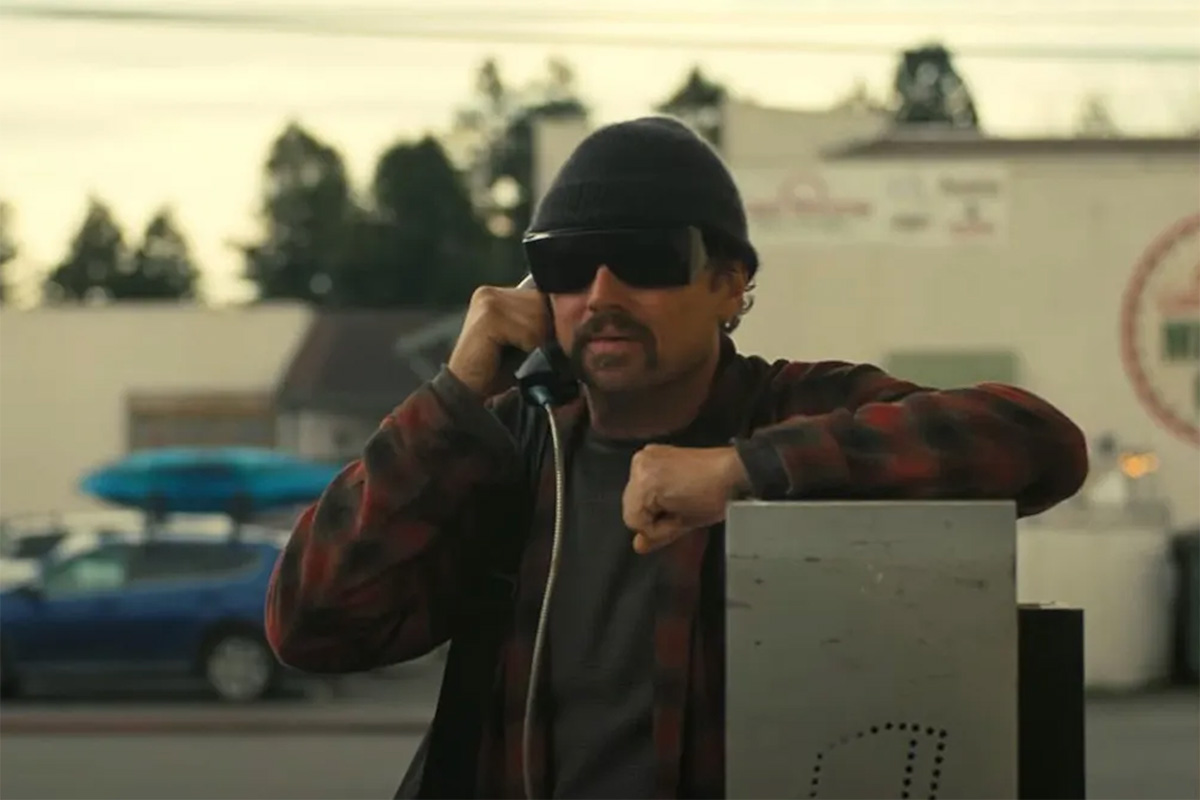
When Paul Thomas Anderson’s “One Battle After Another” debuted on American movie screens last September, it had a lot of things going for it: an acclaimed Hollywood auteur working with a cast that included three Oscar-winning actors, on an ambitious blockbuster with his biggest budget to date, and a $70 million advertising campaign to draw in the crowds. It was even released in IMAX.
It was still a box office disappointment, failing to achieve its “break-even” threshold before making the jump from big screen to small via VOD rentals and streaming on HBO Max. Whatever the reason – an ambivalence toward its stars, a lack of clarity around what it was about, divisive pushback from both progressive and conservative camps over perceived messaging, or a general sense of fatigue over real-world events that had pushed potential moviegoers to their saturation point for politically charged material – audiences failed to show up for it.
The story did not end there, of course; most critics, unconcerned with box office receipts, embraced Anderson’s grand-scale opus, and it’s now a top contender in this year’s awards race, already securing top prizes at the Golden Globe and Critics’ Choice Awards, nominated for a record number of SAG’s Actor Awards, and almost certain to be a front runner in multiple categories at the Academy Awards on March 15.
For cinema buffs who care about such things, that means the time has come: get over all those misgivings and hesitations, whatever reasons might be behind them, and see for yourself why it’s at the top of so many “Best Of” lists.
Adapted by Anderson from the 1990 Thomas Pynchon novel “Vineland,” “One Battle” is part action thriller, part political allegory, part jet-black satire, and – as the first feature film shot primarily in the “VistaVision” format since the early 1960s – all gloriously cinematic. It unspools a near-mythic saga of oppression, resistance, and family bonds, set in an authoritarian America of unspecified date, in which a former revolutionary (Leonardo DiCaprio) is attempting to raise his teenage daughter (Chase Infiniti) under the radar after her mother (Teyana Taylor) betrayed the movement and fled the country. Now living under a fake identity and consumed by paranoia and a weed habit, he has grown soft and unprepared when a corrupt military officer (Sean Penn) – who may be his daughter’s real biological father – tracks them down and apprehends her. Determined to rescue her, he reconnects with his old revolutionary network and enlists the aid of her karate teacher (Benicio Del Toro), embarking on a desperate rescue mission while her captor plots to erase all traces of his former “indiscretion” with her mother.
It’s a plot straight out of a mainstream action melodrama, top-heavy with opportunities for old-school action, sensationalistic violence, and epic car chases (all of which it delivers), but in the hands of Anderson – whose sensibilities always strike a provocative balance between introspection, nostalgia, and a sense of apt-but-irreverent destiny – it becomes much more intriguing than the generic tropes with which he invokes to cover his own absurdist leanings.
Indeed, it’s that absurdity which infuses “One Battle” with a bemusedly observational tone and emerges to distinguish it from the “action movie” format it uses to relay its narrative. From DiCaprio (whose performance highlights his subtle comedic gifts as much as his “serious” acting chops) as a bathrobe-clad underdog hero with shades of The Dude from the Coen Brothers’ “The Big Liebowski,” to the uncomfortably hilarious creepy secret society of financially elite white supremacists that lurks in the margins of the action, Anderson gives us plenty of satirical fodder to chuckle about, even if we cringe as we do it; like that masterpiece of too-close-to-home political comedy, Stanley Kubrick’s 1964 nuclear holocaust farce “Dr. Strangelove,” it offers us ridiculousness and buffoonery which rings so perfectly true in a terrifying reality that we can’t really laugh at it.
That, perhaps, is why Anderson’s film has had a hard time drawing viewers; though it’s based on a book from nearly four decades ago and it was conceived, written, and created well before our current political reality, the world it creates hits a little too close to home. It imagines a roughly contemporary America ruled by a draconian regime, where immigration enforcement, police, and the military all seem wrapped into one oppressive force, and where unapologetic racism dictates an entire ideology that works in the shadows to impose its twisted values on the world. When it was conceived and written, it must have felt like an exaggeration; now, watching the final product in 2026, it feels almost like an inevitability. Let’s face it, none of us wants to accept the reality of fascism imposing itself on our daily lives; a movie that forces us to confront it is, unfortunately, bound to feel like a downer. We get enough “doomscrolling” on social media; we can’t be faulted for not wanting more of it when we sit down to watch a movie.
In truth, however, “One Battle” is anything but a downer. Full of comedic flourish, it maintains a rigorous distance that makes it impossible to make snap judgments about its characters, and that makes all the difference – especially with characters like DiCaprio’s protective dad, whose behavior sometimes feels toxic from a certain point of view. And though it’s a movie which has no qualms about showing us terrifying things we would rather not see, it somehow comes off better in the end than it might have done by making everything feel safe.
“Safe” is something we are never allowed to feel in Anderson’s outlandish action adventure, even at an intellectual level; even if we can laugh at some of its over-the-top flourishes or find emotional (or ideological) satisfaction in the way things ultimately play out, we can’t walk away from it without feeling the dread that comes from recognizing the ugly truths behind its satirical absurdities. In the end, it’s all too real, too familiar, too dire for us not to be unsettled. After all, it’s only a movie, but the things it shows us are not far removed from the world outside our doors. Indeed, they’re getting closer every day.
Visually masterful, superbly performed, and flawlessly delivered by a cinematic master, it’s a movie that, like it or not, confronts us with the discomforting reality we face, and there’s nobody to save it from us but ourselves.
Sports
‘Heated Rivalry’ stars to participate in Olympic torch relay
Games to take place next month in Italy

“Heated Rivalry” stars Hudson Williams and Connor Storrie will participate in the Olympic torch relay ahead of the 2026 Winter Olympics that will take place next month in Italy.
HBO Max, which distributes “Heated Rivalry” in the U.S., made the announcement on Thursday in a press release.
The games will take place in Milan and Cortina from Feb. 6-22. The HBO Max announcement did not specifically say when Williams and Storrie will participate in the torch relay.
Bars & Parties
Here’s where to watch ‘RuPaul’s Drag Race’ with fellow fans
Entertainers TrevHER and Grey host event with live performance
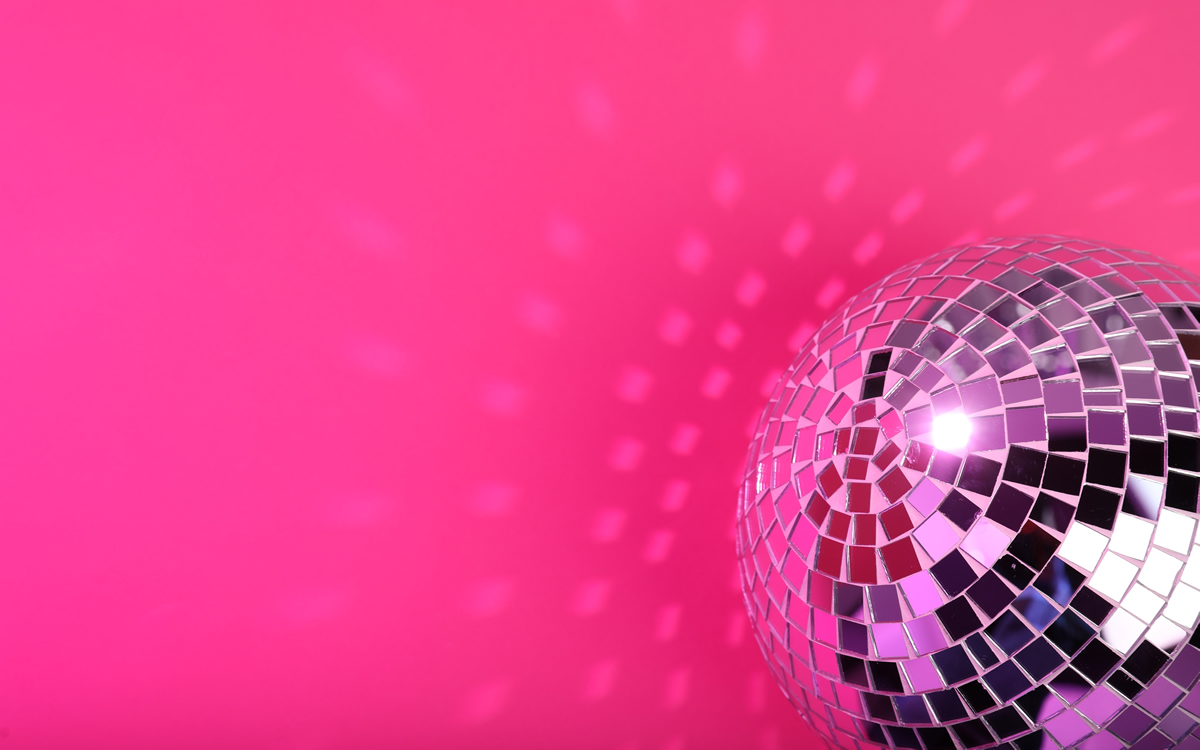
Spark Social Events will host “Ru Paul’s Drag Race S18 Watch Party Hosted by Local Drag Queens” on Friday, Jan. 23 at 8 p.m.
Drag entertainers TrevHER and Grey will provide commentary and make live predictions on who’s staying and who’s going home. Stick around after the show for a live drag performance. The watch party will take place on a heated outdoor patio and cozy indoor space.
This event is free and more details are available on Eventbrite.


